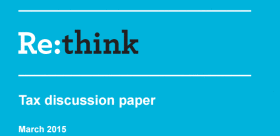Yesterday, the Treasurer Joe Hockey released a discussion paper on taxation. Titled Re:think, it is a call for comment, ideas and options (by 1 June) which will then feed into a Green Paper of workable options, that then forms the basis of a White Paper to be released before the next federal election. The challenge, according to the discussion paper, is “to think creatively about the kind of tax system that will enable us to better realise the opportunities before us” in search of “a better tax system that delivers taxes which are lower, simpler and fairer”.
The top-level discussion points revolve around GST, personal and company tax, online sales (which avoid tax), bracket creep and tax on superannuation. The Re:think discussion paper indicates that Australia’s current dependence on personal and company tax is very high in comparison with other countries – a point which is arguable (because of different tax regimes) according to Fairfax economic journalist, Peter Martin.
Whether this is the case or not, no one seems to be arguing that our GST is very low compared to most OECD nations – at 10 per cent it is about half that charged in most other comparable economies. The GST is, however, a regressive tax that hits the poor hardest, so the suggestion that an increase in the rate of the GST would need to be accompanied by concessions for the least well off has also been floated. In an increasingly globalised world economy, taxing online sales and international trades is becoming ever more difficult. And bracket creep – where earning higher wages pushes many previously ‘average’ wage earners into higher tax brackets – is inevitable.
Tax concessions on superannuation mean a much lower rate of tax is applied to contributions and this system has been shown, over time, to be heavily skewed in favour of those on higher incomes. Negative gearing, capital gains tax on property and the uneven application of tax on bank deposits, property and shares are also up for discussion.
Join the conversation by contacting the Tax White Paper Task Force.
Opinion: A step in right direction
There is a lot to like about the Re:think discussion paper. Firstly, instead of a narrow list of policies, ordinary Australians are actually being asked how they think our tax system could be simpler and fairer. So the three step process:
- an outline of issues and call for comment
- a ‘green’ paper of likely policies, and
- a final white paper of intended changes
- is inclusive, considered and comprehensive.
Yes, much of this work was done by the Henry Review in 2010 when the Labor Party famously rejected nearly all of the proposals. But the world turns quickly, so five years down the track it its fair to say we have learnt a lot more about globalisation and digital financial transactions and this knowledge is valuable in the search for reform.
What hasn’t changed, however, is the need for a more equitable retirement income system. The Age Pension remains far too low to support a modest, let alone reasonable standard of living. It costs the nation approximately $39 billion a year. But superannuation tax concessions cost us $35 billion and they currently favour the wealthiest 20 per cent of the population. Within the next few years they will cost us $50 billion – overtaking the cost of the pension. This is the so-called ‘low hanging fruit’ the taxation review must address. But will any government or political party have the courage to take on our biggest financial institutions to reduce these concessions? I sincerely hope so.
What do you think? Do you have ideas on how our tax system can be reformed? Is an increase in the rate and scope of GST a no-brainer?

